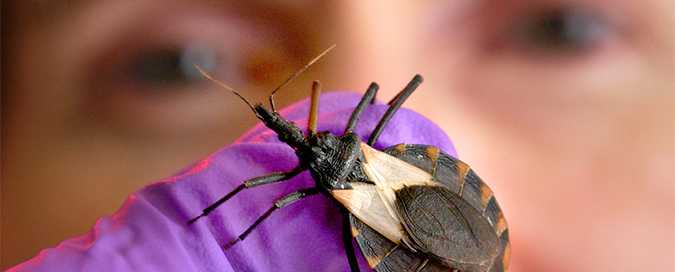International Chagas Day – April 14, 2017

International Chagas Day is April 14. On this day, we bring awareness to this neglected disease of the Americas.
Chagas disease is named for Dr. Carlos Chagas, who discovered it more than 100 years ago. Caused by the Trypanosoma cruzi parasite, Chagas disease affects 6–7 million people worldwide and an estimated 300,000 in the United States.
Efforts to control Chagas disease by reducing the number of new infections have been successful, but some challenges remain. T. cruzi infections are transmitted by a vector (from infected triatomine bugs, also known as “kissing bugs”) and through blood transfusion, organ transplantation, or congenital (mother-to-baby) transmission. In Latin American countries where the parasite exists, elimination of triatomine bugs that have adapted to living in people’s homes has been largely successful; and blood donor screening to prevent transfusion transmission is established where people at risk for Chagas disease may live.
One of the remaining challenges is preventing congenital Chagas disease in babies born to chronically infected mothers. While prevention of new infections is critically important, we must also work to ensure that the millions of people already chronically infected and at risk for developing debilitating or fatal cardiac disease receive timely diagnosis and treatment.
CDC Commemorates International Chagas Day
Today, CDC joins partners around the world in raising awareness about Chagas disease.
Share our International Chagas Day features:
- CDC Global Health Feature
- Infographic about the global burden of Chagas disease
- Blog by CDC Chagas disease expert
- Story about how CDC is working with partners to increase awareness of the disease among healthcare providers
- Video about Chagas disease by partners on the Texas Chagas Disease Task Force
- Center for Global Health on Twitter
- Center for Global Health on Facebook
Additional Resources:
- General information about Chagas disease
- Printable resources for patients and healthcare providers (in English and Spanish)
- Accredited continuing education for healthcare providers
- Information about Neglected Parasitic Infections of the United States
- Podcast: Chagas Disease: No Longer Exotic
- Page last reviewed: April 14, 2017
- Page last updated: April 14, 2017
- Content source:


 ShareCompartir
ShareCompartir